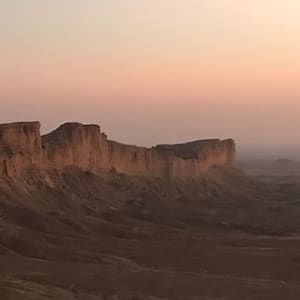edge of the world: Idiom Meaning and Origin
What does ‘edge of the world’ mean?
The idiom "edge of the world" refers to a metaphorical location beyond which everything is unknown or uncharted. It signifies the limit or boundary of one's knowledge or experience.

Idiom Explorer
The idiom "outside world" refers to the world beyond a specific place or situation. It represents a realm that is different or separate from one's immediate surroundings. It is often used to emphasize the contrast between one's current situation and the larger world or society.
The idiom "know no bounds" means that something or someone is limitless or knows no limits or boundaries. It implies that there are no restrictions or constraints on their actions or potential.
An idiomatic expression coined by Winston Churchill referring to the figurative barrier separating the communist nations of Eastern Europe from the democratic nations of Western Europe during the Cold War.
The idiom "in the world" is used to emphasize something by placing it in a broader context. It implies that there is no greater or more extreme example of that thing anywhere else.
The idiom "hell on earth" refers to a situation or place that is extremely unpleasant, chaotic, or filled with suffering, resembling the horrors commonly associated with the concept of hell.
The idiom "great beyond" refers to the unknown or beyond what is known or comprehensible. It implies something that is beyond the scope of our understanding or beyond the limits of our knowledge. It can also refer to the afterlife or the world beyond death.
The idiom "go to the ends of the earth" means to do everything possible or make extreme efforts to achieve or find something.
The idiom "go too far" means to exceed the limits or boundaries of what is acceptable or reasonable.
An idiom used to describe someone leaving or departing. It implies a physical or metaphorical departure from a place or situation.
The idiom "God's green earth" refers to the entire world or the whole earth. It is often used when expressing surprise or emphasizing a point.
Unveiling the Unknown
The idiom "edge of the world" is a phrase often used to refer to a remote or isolated place or situation. It represents the furthest point one can go, both physically and metaphorically. While the origins of this idiom are not entirely clear, it has been used in literature and popular culture for centuries, indicating its long-standing presence in the English language.
One source of the idiom can be traced back to ancient beliefs about the Earth's shape. In earlier times, people imagined that there was an actual edge on the Earth, beyond which one would fall off into the abyss. This notion likely influenced the development of the idiomatic expression.
Additionally, sailors and adventurers throughout history used the idiom to describe their travels to the "edge of the world" as they ventured into uncharted territories and reached the outer limits of known lands. This reflects the idea of exploring the unknown and pushing the boundaries of human knowledge.
The idiom is also popular in literature and artistic works, with many authors and poets incorporating the concept of the "edge of the world" into their works. They use it as a metaphor for exploration, longing, and the desire to escape the confines of the familiar. This literary association has contributed to the idiom's enduring presence in the English language.
Today, the idiom "edge of the world" can be understood figuratively, beyond its literal interpretations. It conveys a sense of being at the extremity of one's knowledge, capabilities, or emotional state. It signifies a point where one feels the furthest they can go, both physically and metaphorically. It carries a sense of reaching the limits of what is known or possible.
The idiom "edge of the earth" is related to the concept of the "edge of the world." It is often used interchangeably and carries a similar meaning. The phrase "edge of the earth" also alludes to the belief in a flat Earth with an actual edge beyond which one would fall off.
Another related idiom is "outside world." This phrase refers to the world beyond one's immediate surroundings or personal experiences. It suggests a realm that is outside of one's comfort zone or usual sphere of knowledge. The concept of the "edge of the world" can be seen as a metaphorical representation of the "outside world," as it symbolizes the farthest point one can go.
The idiom "great beyond" is also connected to the idea of the "edge of the world." It refers to a realm or existence beyond what is known or understood. It can represent the unknown, the afterlife, or other realms outside of human comprehension. The exploration of the "great beyond" aligns with the idea of pushing the boundaries of human knowledge and experience, which is reflected in the use of the idiom "edge of the world."
The idiom "edge of the world" has a rich history and has evolved in meaning over time. It draws on ancient beliefs about the Earth's shape, exploratory expeditions, as well as artistic and literary representations. Today, it is widely used to symbolize the furthest point one can go, both physically and metaphorically. It captures the essence of pushing boundaries, exploring the unknown, and transcending limitations. The idiom invites contemplation about human curiosity and the desire to uncover what lies beyond the edge.
Example usage
Examples:
- She felt like she was standing on the edge of the world as she looked out at the vast expanse of ocean.
- After hiking for hours, they finally reached the top of the mountain and felt like they were on the edge of the world, surrounded by breathtaking views.
- Living in a remote village in the mountains, he often felt like he was on the edge of the world, far away from civilization.
More "Exploration" idioms



